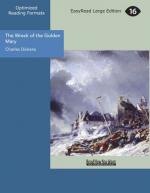* * * * *
All that follows, was written by John Steadiman, Chief Mate:
On the twenty-sixth day after the foundering of the Golden Mary at sea, I, John Steadiman, was sitting in my place in the stern-sheets of the Surf-boat, with just sense enough left in me to steer—that is to say, with my eyes strained, wide-awake, over the bows of the boat, and my brains fast asleep and dreaming—when I was roused upon a sudden by our second mate, Mr. William Rames.
“Let me take a spell in your place,” says he. “And look you out for the Long-boat astern. The last time she rose on the crest of a wave, I thought I made out a signal flying aboard her.”
We shifted our places, clumsily and slowly enough, for we were both of us weak and dazed with wet, cold, and hunger. I waited some time, watching the heavy rollers astern, before the Long-boat rose a-top of one of them at the same time with us. At last, she was heaved up for a moment well in view, and there, sure enough, was the signal flying aboard of her—a strip of rag of some sort, rigged to an oar, and hoisted in her bows.
“What does it mean?” says Rames to me in a quavering, trembling sort of voice. “Do they signal a sail in sight?”
“Hush, for God’s sake!” says I, clapping my hand over his mouth. “Don’t let the people hear you. They’ll all go mad together if we mislead them about that signal. Wait a bit, till I have another look at it.”
I held on by him, for he had set me all of a tremble with his notion of a sail in sight, and watched for the Long-boat again. Up she rose on the top of another roller. I made out the signal clearly, that second time, and saw that it was rigged half-mast high.
“Rames,” says I, “it’s a signal of distress. Pass the word forward to keep her before the sea, and no more. We must get the Long-boat within hailing distance of us, as soon as possible.”
I dropped down into my old place at the tiller without another word—for the thought went through me like a knife that something had happened to Captain Ravender. I should consider myself unworthy to write another line of this statement, if I had not made up my mind to speak the truth, the whole truth, and nothing but the truth—and I must, therefore, confess plainly that now, for the first time, my heart sank within me. This weakness on my part was produced in some degree, as I take it, by the exhausting effects of previous anxiety and grief.
Our provisions—if I may give that name to what we had left—were reduced to the rind of one lemon and about a couple of handsfull of coffee-berries. Besides these great distresses, caused by the death, the danger, and the suffering among my crew and passengers, I had had a little distress of my own to shake me still more, in the death of the child whom I had got to be very fond of on the voyage out—so fond that I was secretly a little jealous of her being taken in the Long-boat instead




